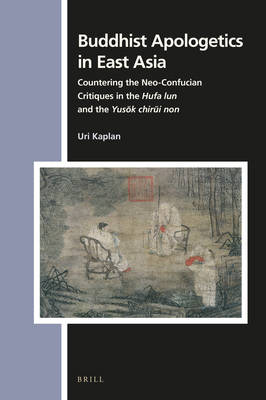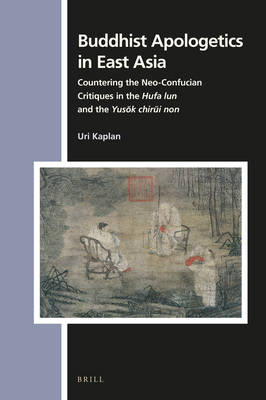
- Afhalen na 1 uur in een winkel met voorraad
- Gratis thuislevering in België vanaf € 30
- Ruim aanbod met 7 miljoen producten
- Afhalen na 1 uur in een winkel met voorraad
- Gratis thuislevering in België vanaf € 30
- Ruim aanbod met 7 miljoen producten
Zoeken
Buddhist Apologetics in East Asia
Countering the Neo-Confucian Critiques in the Hufa Lun and the Yusŏk Chirŭi Non
Uri Kaplan
€ 247,45
+ 494 punten
Omschrijving
While the Neo-Confucian critique of Buddhism is fairly well-known, little attention has been given to the Buddhist reactions to this harangue. The fact is, however, that over a dozen apologetic essays have been written by Buddhists in China, Korea, and Japan in response to the Neo-Confucians. Buddhist Apologetics in East Asia offers an introduction to this Buddhist literary genre. It centers on full translations of two dominant apologetic works--the Hufa lun (護法論), written by a Buddhist politician in twelfth-century China, and the Yusŏk chirŭi non (儒釋質疑論), authored by an anonymous monk in fifteenth-century Korea. Put together, these two texts demonstrate the wide variety of polemical strategies and the cross-national intertextuality of East Asian Buddhist apologetics.
Specificaties
Betrokkenen
- Auteur(s):
- Uitgeverij:
Inhoud
- Aantal bladzijden:
- 282
- Taal:
- Engels
- Reeks:
- Reeksnummer:
- nr. 163
Eigenschappen
- Productcode (EAN):
- 9789004405332
- Verschijningsdatum:
- 22/08/2019
- Uitvoering:
- Hardcover
- Formaat:
- Genaaid
- Afmetingen:
- 162 mm x 240 mm
- Gewicht:
- 539 g

Alleen bij Standaard Boekhandel
+ 494 punten op je klantenkaart van Standaard Boekhandel
Beoordelingen
We publiceren alleen reviews die voldoen aan de voorwaarden voor reviews. Bekijk onze voorwaarden voor reviews.








